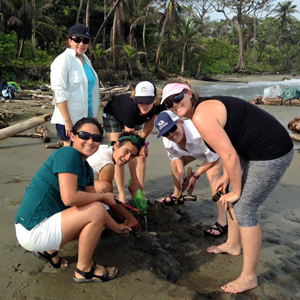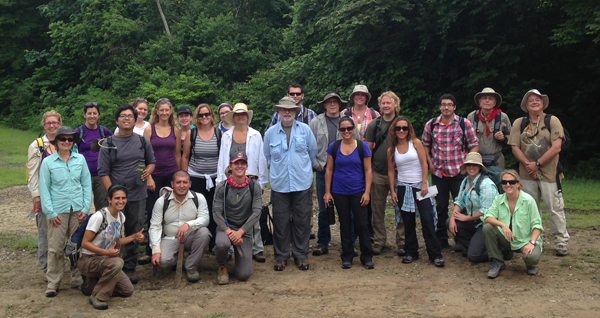By Isaac Magallanes | PCP PIRE Summer 2015 Field Intern
My name is Isaac Magallanes and I am currently an undergraduate student at California State University, Fullerton. When I graduate I will have my degree in geology with an emphasis on paleontology. I became interested in paleontology at a very early age. As a child I can remember being excited every time I went to the library because it meant that I was going to check a new book on fossils. Luckily, I have had the opportunity to pursue this long-lived passion of mine.

During the summer of 2015, I participated in the PCP-PIRE (Panama Canal Project-Partnership for International Research and Education) internship. During my time as an intern I took part in collecting fossils from various localities in and near the Panama Canal. Most of my days were spent searching for fossils in the canal with my fellow interns; however we did have the opportunity to work with teachers who were a part of GABI RET (Great American Biotic Interchange-Research Experience for Teachers).
Working with the teachers from GABI RET turned out to be an exciting and incredibly rewarding experience for me. My fellow interns and I spent two weeks conducting fieldwork and sharing ideas with the teachers. We visited many fossil localities during this time that included Lago Alajuela, Lago Bayano and several localities near the Gatun Locks on the Atlantic side of the canal. We found many different types of fossils at these localities that ranged from tiny shark teeth to turtle shell plates to whale bones! It certainly was a very successful trip that allowed many of the teachers to take teaching samples back to their classrooms.
One of the most rewarding parts of the GABI RET program that I was able to experience was working with the teachers in lesson planning. Close to the end of their time in Panama we visited the BioMuseo and received a tour of the museum, which helped spark our creativity. After our tour my fellow interns and I participated in helping to build lesson plans with the teachers. This was something that I had previously never done before; however, it turned out to be very fun and enjoyable.
Working with the GABI RET teachers was a great experience that was beneficial in many ways. I was able to network with real teachers and form connections that opened doors for me to visit schools and talk to students about what I do as a paleontologist. In addition, I was also able to see what it was like to be on the other side of the classroom, having the opportunity to see teachers in action creating lesson plans gave me a chance to see the process of how information reaches students.

Editor’s note: To learn more about the GABI-RET 2015 excursion to Panama, be sure to go to gabiret.com and read the blog posts by the participants.
Por Isaac Magallanes | Practicante del Verano 2015
Mi nombre es Isaac Magallanes y actualmente soy un estudiante de pregrado en la Universidad Estatal de California en Fullerton. Cuando me gradúe, voy a tener un título en geología con énfasis en paleontología. Me interesé en la paleontología a una edad muy temprana. Cuando era niño, recuerdo que me emocionaba cada vez que iba a la biblioteca porque significaba que iba a revisar un nuevo libro sobre fósiles. Por suerte, he tenido la oportunidad de seguir esta gran pasión de mi vida.

Durante el verano del 2015, participé en la pasantía del PCP-PIRE (Proyecto del Canal de Panamá- Colaboración para la Investigación Internacional y la Educación). Durante mi tiempo como pasante participé en la colecta de fósiles de diversas localidades en y cerca del Canal de Panamá. La mayoría de mis días los pasé buscando fósiles en el Canal con mis otros compañeros practicantes; sin embargo, también tuvimos la oportunidad de trabajar con los profesores que formaban parte de GABI RET (Gran Intercambio Biótico Americano-Experiencia de Investigación para Profesores).
Trabajar con los profesores de GABI RET resultó ser una experiencia emocionante y muy gratificante para mí. Mis compañeros practicantes y yo pasamos dos semanas realizando trabajo de campo e intercambiando ideas con los profesores. Visitamos muchas localidades fosilíferas durante este tiempo incluyendo el Lago Alajuela, el Lago Bayano y varias localidades cerca de las esclusas de Gatún en el lado Atlántico del Canal. Encontramos muchos tipos diferentes de fósiles en estas localidades, desde diminutos dientes de tiburón hasta placas de tortuga y huesos de ballena. Sin duda, fue un viaje muy exitoso que permitió a muchos de los profesores llevar muestras educativas a sus aulas de clase.
Una de las partes más gratificantes del programa GABI RET fue nuestra experiencia planificando lecciones de clase con los maestros. Cerca del final de la estadía de los profesores en Panamá visitamos el BioMuseo y recibimos un recorrido por el mismo, lo que ayudó a despertar nuestra creatividad. Después de nuestra visita, mis compañeros practicantes y yo ayudamos a crear planes curriculares con los maestros. Esto era algo que nunca antes había hecho; sin embargo, resultó ser muy divertido y agradable.
Trabajar con los maestros del GABI RET fue una gran experiencia que fue beneficiosa en muchos sentidos. Tuve la oportunidad de establecer contactos con profesores verdaderos y formar conexiones que me abren las puertas para visitar escuelas y hablar con estudiantes acerca de lo que hago como paleontólogo. Además, también fui capaz de ver cómo era estar al otro lado de la sala de clase, tuve la oportunidad de ver a los maestros en acción durante la creación de planes de estudio y la oportunidad de ver el proceso de cómo la información llega a los estudiantes.

Nota del editor: Para obtener más información sobre la excursión en Panamá del GABI-RET 2015, asegúrese de visitar gabiret.com y leer las publicaciones de los participantes en el blog.